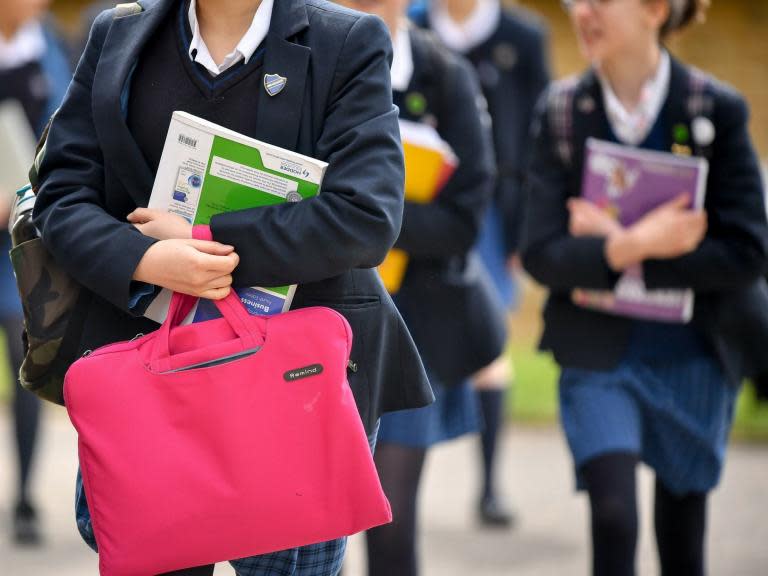England one of worst countries for bullying among school pupils, global survey suggests
England is one of the worst countries for bullying among secondary school pupils, a global survey of teachers has revealed.
The frequency of bullying in schools has declined in a number of countries since 2013 – but in England it has almost doubled in five years, a survey of around 260,000 teachers suggests.
Nearly three in ten (29 per cent) secondary school headteachers in England said bullying occurred at least weekly among students – the fourth highest among the 48 countries surveyed.
In 2013, the proportion of heads reporting weekly physical and non-physical bullying among pupils was only 15 per cent.
Secondary school heads in England have also reported the highest level of cyberbullying among students compared to other countries, the teacher and learning international survey (Talis) shows.
The study by the Organisation for Economic Co-operation and Development (OECD) reveals 14 per cent of secondary principals in England have received reports from a student or parent or guardian about hurtful posts on the internet or social media about students.
And 27 per cent received reports of unwanted electronic contact among students in their school
These were the highest figures across the OECD, which had an average of 2 per cent and 3 per cent respectively.
Andreas Schleicher, the OECD’s director of education and skills, said the increased reports of bullying in English schools is likely to have been driven by a rise in cyberbullying over the past five years.
Speaking at the launch of the report, Mr Schleicher said he believed a clearer policy on cyberbullying could be introduced in England to ensure the issue is prioritised and schools know what to do.
He said: “Cyberbullying in terms of unwanted contact or students being exposed on the internet is the dark side of the modern age.
“But it is something that schools really need to get to grips with. I don’t think English schools and the schools system have the policy yet for this.”
Mr Schleicher highlighted how some school systems have already made this a priority and introduced policies to tackle it – such as France, where mobile phones are banned in schools.
He said: “We can no longer ignore it and just leave it for individual schools to sort out. This is probably something that school systems need to look at systemically.”
The report also found teachers in England work more hours than anywhere else in Europe.
They work 47 hours a week on average, the fourth highest of the OECD, with only teachers in Japan, Kazakhstan and Alberta, Canada, putting in more hours.
The survey also revealed English headteachers are more concerned about shortages of qualified teachers than in many other countries.
Mary Bousted, joint general secretary of the National Education Union, said: “The findings should act as a wake-up call for any future prime minister.
“The government must end teachers’ unsustainable workload by tackling the high-stakes school accountability system, which is fuelling the long hours culture and driving teachers out of the profession.”
Sarah Hannafin, senior policy advisor at school leaders’ union NAHT, says “Cyberbullying is a complex issue and takes many forms, often happening out of school hours. More national guidance is needed to support schools in how to best deal with incidents and support students.”
Geoff Barton, general secretary of the Association of School and College Leaders, called on the government to invest more in support services for vulnerable families to challenge cyberbullying.
He also said social media companies “must take more action” to police and prevent the trend.
Damian Hinds, the education secretary, said: “These findings reflect many of the frustrations that I heard from teachers and heads when I first took on the role of education secretary and underlines the importance of the Teacher Recruitment and Retention Strategy, that I launched in January.
“We know that too many teachers are having to work too many hours each week on unnecessary tasks, which is why I have taken on a battle to reduce teachers’ workload so that they can focus on spending their time in the classroom doing what they do best – teaching.”

 Yahoo News
Yahoo News 

